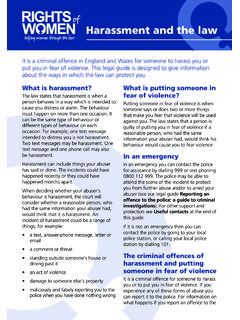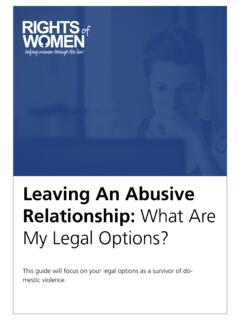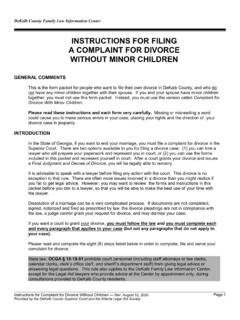Transcription of Applying For A Transfer Of Tenancy - Rights of Women
1 This guide will explain when it is possible to apply to Transfer a Tenancy into your sole For A Transfer Of TenancyThis guide will explain when it is possible to apply to Transfer a Tenancy into your sole of Women produces a number of other legal guides that you may find useful. You can access our full range of legal guides at is a Tenancy ?A Tenancy is an agreement that you can rent a property or part of a property, normally to live in, for a certain length of time. If you rent the home you live in, you are likely to have a Tenancy agreement that sets out the conditions of you living there. It is important to know what type of Tenancy you have and whether it is a Tenancy or a licence.
2 This is explained further in this person who rents the property under the Tenancy agreement, is called the tenant. The person or organisation who rents out the property to the tenant is called the landlord. If there is more than one tenant renting a property together, such as a couple who live together, they are called joint tenants provided both have entered into the Tenancy agreement with the guide is about transfers of tenancies between spouses, civil partners or cohabitees. It does not cover eviction by landlords or obtaining housing. If you need housing advice see Useful contacts for a list of organisations that may be able to I have a Tenancy or a licence?
3 If you are living in rented property then it is important that you know what type of rental agreement you have. Sometimes, people who live in shared accommodation such as hostel accommodation or a refuge do not have a Tenancy agreement but live there under what is called a licence. If you live in a property under a licence, your Rights in relation to the property are different. You should still have a licence agreement which sets out the conditions of your ability to live at the you are living somewhere under a licence, you can be asked to leave with reasonable notice which may only be one or two weeks. A Tenancy agreement provides better protection.
4 The rest of this guide applies to tenancies only. If you are unsure, see Useful contacts at the end of this guide to talk to someone about whether you have a licence or a Tenancy type of Tenancy do I have?These are the most common types of tenancies: Tenancies with a private landlord (called assured shorthold tenancies) Tenancies with local authorities, housing associations or other registered social landlords (including secure tenancies and assured tenancies)Your Tenancy agreement will say what type of Tenancy you have. If you are unsure whether you have a Tenancy or what type of Tenancy you have then seek help from an organisation such as those listed in Useful is named as tenants on the Tenancy agreement?
5 The Tenancy agreement will state who is the tenant. It could be one person (sole tenant). It could be more than one person (joint tenants). We are both named as tenants on the agreement (joint tenants)If one of you has left or will be leaving the home and the other is to remain then it is sensible to arrange a Tenancy in the sole name of the person remaining. This is because whilst the person who has left is a joint tenant they have a right to enter and live in the home (unless there is an occupation order preventing him from doing this see our guide Domestic violence injunctions). There are also other reasons why you may want to end the joint Tenancy , for example you will both be responsible for rent and bills for the property whilst you are both named as tenants on the Tenancy agreement, even if one of you has moved out.
6 If the property is in your ex-partner or spouse s sole name, or in your joint names, it is possible for him to end the Tenancy agreement by himself. If there is a disagreement about the Tenancy you can ask your ex-partner or spouse to agree not to end the Tenancy until the issue has been resolved. You should also write to the landlord to let them know that if your partner or spouse tries to end the Tenancy then this is not something that you agree with or something that you want to you think your ex-partner or spouse will try to end the Tenancy without your consent then you can apply to the court for an injunction to stop them giving notice to end the Tenancy .
7 It may be important to act fast and get urgent advice on obtaining the injunction by contacting a solicitor or one of the organisations listed in the Useful contacts am the sole tenantIf you are married or in a civil partnership then your spouse has a right to live in your home even though it is in your sole name. This right will end when your marriage or civil partnership ends (See our guide on Marriage: your Rights to your home). If you want to stop your spouse from entering or living in your home before the divorce then you can apply for an occupation order. See our guide Domestic violence injunctions. If you are not married then your partner has no right to live in your home unless your partner obtains an occupation order from the courts.
8 If your partner does not have an occupation order and is refusing to leave or you are concerned about your safety see our guide on Domestic violence you want to leave the home but your partner or spouse wishes to remain then you can agree to the Tenancy being transferred to his sole name. However, make sure you seek advice first (see Useful contacts) as this may prevent you from getting some types of social ex-partner or spouse is the sole tenantIf you are married then you have a right to live in the property unless there is an occupation order forbidding you from being in the home. You can apply for an occupation order if your spouse is refusing to allow you to enter the home, or if you want to remove your spouse from the home.
9 See our guide Domestic violence you are not married then you have no automatic right to live in the property. You can apply for an occupation order allowing you to live in the home and requiring your partner to leave and not enter the occupation order will not change the Tenancy agreement. If you want the Tenancy agreement to be transferred to you then see the remainder of this you are worried that your ex-partner or spouse will end the Tenancy without your consent then you can apply to the court for an injunction to stop them giving notice to end the Tenancy . It may be important to act fast and get urgent advice on obtaining the injunction by contacting a solicitor or one of the organisations listed in the Useful contacts section.
10 Difference between social housing and renting from private landlordsSocial housing means homes rented out by local authorities (the council) or housing associations, which are not for profit. Housing which is not social housing is referred to as the private rented sector or private landlords. Tenancy agreements with a private landlordIn general, if you are renting a house or a flat in the private sector it will usually be an assured shorthold Tenancy . Assured shorthold tenancies normally last for a set period of time (fixed term) and it is expected that the tenants will leave the property at the end of that time unless the landlord and tenants agree that it will continue.









